Life at King's College London
and St Boniface College Warminster
in the 1960s
Preface
This page aims to paint a picture of what college life was like for those Kingsmen who trained for ordination at London and Warminster in the mid-1960s. It is a personal picture of college life, as seen through the eyes and experience of Richard Carr who went up to King's in October 1962 and left at the end of his Warminster year in spring 1966. That he retains such clear memories of his time at college is testimony to the enormous influence King's had on him and, he believes, on virtually all, if not all, those who were privileged to benefit from its unique and first-class ordination training.
It has been said that priests who were a product of King’s College, London, and its fourth year college at Warminster, had a particular stamp upon them. An observation one is inclined to think contains more than a grain of truth.
My Journey to King's
It was while at school that I felt the call to ordination. In my home parish there was a very personable young curate called David Smith. It was he who encouraged me to apply to King's for my training and I am profoundly grateful that he did. David himself had trained at King's. He was later to become Bishop of Maidstone, then Bishop of Bradford until his retirement.
Brought up in the north east of England, my very first visit to London was made at the age of 19 to attend an interview with the Dean of King's, Sydney Evans. The interview was held in his office on 'C' corridor of the college building which stands between Aldwych and Victoria Embankment on the Thames. Totally new and unfamiliar territory for me, both geographically and psychologically.
The study of languages was never one of my strengths. I failed O Level Latin abysmally. Aware that New Testament Greek was to be a major and compulsory subject of study at King's, I felt it necessary to try to gain some familiarity with the subject before going up to London. I bought a copy of Eric Jay's New Testament Greek - An Introductory Grammar, the text book used at King's. My attempts to get to grips with some of the basics, with the help of one of our parish's curates, were not highly successful.
This was during the year between school and college when I lived at home in Newcastle upon Tyne and worked on the shop floor of Rowntree's sweet factory at Fawdon. Here, in teams of eight men, we manned machines packing tubes of fruit pastilles. It was shift work: one week from 6:40am to 2:40pm, one week of six nights from 10:40pm to 6:40am, then one week from 2:40pm to 10:40am. My attendance at this college of 'the university of life' was an invaluable experience during which I acquired the soubriquet of 'Dick the Vic'.
King's College, London - 1962 Estimate of Expenses
Before going up to London to start my training at King's, the college sent me an 'Estimate of Expenses'. I still have this document, which is reproduced below.
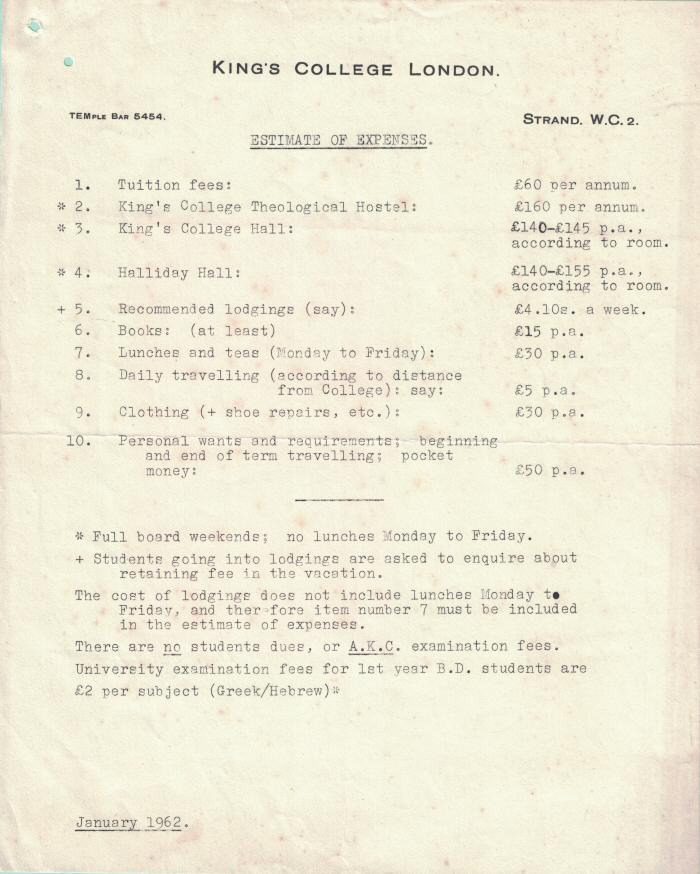
Interesting to note that tuition fees were then £60 per annum, compared with the usual going rate for university tuition fees in 2017 of £9,250 per annum. The costs of recommended lodgings were estimated at £4 10 shillings (£4.50) a week and daily travelling at £5 per annum. The single bus fare up to the Strand from Camberwell, where I lived in King's College Hall for the first two years of my course, was 9d in old money, less than 4p in today's decimal currency. The £15 per annum suggested for books would not be enough to buy one serious academic book in 2024.
The cost of lunches and teas (Monday to Friday) was estimated at £30 per annum. For a change from college refectory lunchtime fare some of us would cross the Strand to India House in the Aldwych. There in the canteen one could get vegetable curry with rice for 2/- (10p). When funds were not too tight I would treat myself to the generous bowl of prawn curry with a plate of rice on offer at 3/6d (17½p).
Arriving in London
When I arrived to start my training in October 1962, it was only the second time I had been to London. Arriving at King's Cross station, the first challenge was to find and catch a bus that would take me to my hall of residence, King's College Hall, close to Denmark Hill in Camberwell. A place entirely new and unfamiliar to me.
Having been at boarding schools from the age of seven to the age of eighteen, adjusting to life in hall was not difficult. It was enjoyable, sharing social activities and friendships with men studying in different faculties, including some doing medicine and dentistry at King's College Hospital. As was usual in those days, the hall was single sex. The only woman in residence was the matron who looked after housekeeping and catering.
The day after arriving at King's College Hall it was time to catch a bus, a number 68 or a 196, up to the Strand for my first day at college. All so new - unknown - so much to find out about and find my way around. The totally new experience of living in London was interesting and enjoyable for someone with my natural curiosity.
Studying at King's
The home of the Theology Faculty was 'C' corridor on the first floor of the main college building. It was reached by wide stairs leading up from the building's large entrance hall. Opposite the top of the stairs were the doors to the chapel where we gathered for Mattins at 9:30 each weekday morning and for other services.
On 'C' corridor, near the top of the stairs, was the door to the office of the Dean's secretary. Miss Medway, no shrinking violet, was a prominent figure in the faculty. She was effectively the Dean's gatekeeper. The only way to the Dean's office was through her office!
Along the side of the corridor opposite the offices of the Dean and his secretary was a long row of wooden lockers. Here each of us had a locker in which we could keep our gown, briefcase and other personal items. It was in the area in front of these lockers that, on a regular daily basis, we crossed the paths of our fellow students. Here we first got to know each other and lasting friendships were formed.
Elsewhere along 'C' corridor were doors to some of the lecture rooms, a number of them with windows that looked out onto the building's large forecourt.
My school education was not an ideal preparation for the King's course I was about to embark on. At school I had studied and enjoyed the sciences - particularly chemistry and physics (which still interest me) - not arts subjects. I might add that my gifts, such as they were and are, are more practical than academic. My father and both grandfathers were engineers. My education and talents were not the best grounding for the study of New Testament Greek (for three years, and a compulsory element of the course) and subjects such as Old and New Testament studies, church history, ethics, and philosophy. I still remember looking at the lectures timetable posted outside the Dean's office on 'C' corridor, when I arrived. I had never heard of Philosophy or Ethics and hadn't a clue what these subjects were about. It was, however, part of the genius of King's that its AKC course was designed to accommodate those of us who did not have the academic mind and abilities required to successfully complete the BD course.
At the Strand our day started with Mattins in the college chapel at 9-30 am. Typically we then had three or four one-hour lectures a day, Monday to Friday. Very different from the one or two lectures a week students receive at some universities these days. Lectures were obligatory, as was the wearing of undergraduate gowns when attending them.
Among the subjects on which we received lectures were New Testament Greek (Reginald Trueman, Richard Coggins, Gordon Huelin), the Old Testament (Ulrich Simon, Prof Peter Ackroyd, Joseph Robinson - who himself trained for ordination at King's and Warminster), the New Testament (Dennis Nineham, Christopher Evans), Biblical History and History of Theology, Church History, Doctrine (Eric Mascall), Liturgy (Ronald Jasper, later appointed Dean of York), Comparative Religion (Geoffrey Parrinder), Philosophy (Professor H D Lewis) and Ethics (Peter Coleman, later Bishop of Crediton). Ernie Warrell gave us valuable guidance on church music. In Audrey Bullard's 'Speech Training' sessions we learned the practical skills involved in public speaking, skills essential for public ministry but sadly lacking in more than a few clergy today. Such was the richness of the input we received at King's.
In addition to lectures there were, of course, tutorials to attend and essays to prepare. Writing essays did not come easily to me. No essay writing was involved in studies for A Level physics, chemistry and maths. Teachers and examiners just required you to show, concisely and without elaboration, that you knew the facts, formulae and relevant calculations. Facts and formulae are not matters for debate or argument. You either know your stuff or you don't. The first essay I submitted was considered very short. My tutor, Morna Hooker, commented that it contained the main facts but needed expanding! It took me some time to adapt my approach to writing essays but achieving a reasonable level of confidence or competence in the art was something that continued to elude me.
Desmond Tutu
In our college year at King's was a young South African priest, Desmond Tutu. At the time he appeared to me, and perhaps to others, to be a quiet, shy, retiring young man. Who among us could have imagined that he would become Archbishop of South Africa; a world-renowned, greatly loved, and fearless leader, working tirelessly for justice and reconciliation? It was members of the Anglican Community of the Resurrection in South Africa who recognised him as a potential indigenous leader of the church in South Africa and who campaigned for him to be sent to King's to study for a BD degree.
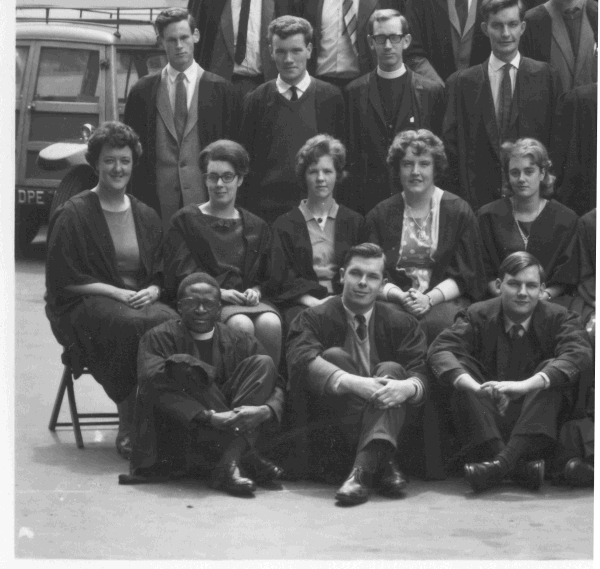
Desmond Tutu, seated on the ground left.
King's College London Faculty of Theology, May 1963.
St Philip's, Avondale Square
During our first two years at King's we were free to decide which church we would attend on Sundays. We were required, I think it must have been annually, to obtain from its incumbent a letter confirming our regular attendance at Sunday worship.
A close friend of my mother, a staunch churchwoman, had spoken very highly of a young priest who was then vicar of St Philip's, Avondale Square, off the Old Kent Road. As St Philip's was not too far from my hall of residence in Camberwell, this was where I chose to go on Sundays.
St Philip's was a predominantly working-class parish. I imagine that pre-war the local community would have been long-established and marked by a strong community spirit, similar to that for which the nearby East End of London was noted. The area had suffered badly during the bombing of London in WW2. Close to the church were new tower blocks of flats that had been built to replace housing destroyed in the war. One afternoon I accompanied the vicar while he did some parish visiting in one of these tower blocks. I gained the impression that the residents of the flats preferred to keep themselves to themselves. The design and layout of the tower blocks and their flats did not seem conducive to the development of the neighbourliness and community spirit that probably marked life in the area before the war.
When I started going to St Philip's in 1962, we worshipped in the church hall. The church itself had been bombed during the war and a new church was being built on the site of the old. This was to a very modern design, with the main body of the church being octagonal. The end result was, and is, an attractive building. I attended its consecration by Mervyn Stockwood, the colourful and controversial Bishop of Southwark. I recall the aspergation during the service when he appeared to greatly enjoy giving the congregation a liberal sprinkling of holy water.
The vicar of St Philip's was Gerald Lane, a man from a humble background. The son, I think, of a former London docker. Gerald was a delightful man. Modest and self-effacing. A very cheerful, warm, friendly and supportive personality. A faithful, loving and effective parish priest who built up an equally warm, friendly and welcoming church community. My two-year association with the parish of St Philip, Avondale Square was a very happy one and I maintained contact with Gerald Lane for many years thereafter.
Summer Vacations
During summer vacations at the end of my first and second year at King's, I and some others in our faculty volunteered to help at annual children's holidays organised by the (then) British Epilepsy Society. The holidays were for around sixty maladjusted children aged between about 3 and 16. The fact that most of these children regularly had epileptic fits was not a problem. When they had fits no one made a big issue of it. Without any fuss we just did what we could to prevent them from hurting themselves until their fits ended.
The staff running these holidays included two very experienced and capable nurses who had access to the medical notes of each child. They found that the frequency of epileptic fits during these holidays was very much less than that recorded when the children were at home. This was put down to the fact that while on these holidays the children were treated as normally as possible, with no big fuss when someone had a fit.
The bigger issue was the maladjustment from which these children suffered. Back in the 1960s many people had little or no understanding of the nature of epilepsy. They found epileptics and their fits frightening. There were even parents who felt embarrassed by, or ashamed of, their epileptic child. Consequently those who suffered from the condition were often avoided by others, young and old, or discreetly kept out of public view. It is unsurprising and understandable that their exclusion from normal social life and activities had behavioural consequences.
The Epilepsy Society had hired the premises of a preparatory school in Hampshire for the first of the holidays at which I helped. During this holiday the headmaster and his wife attempted to continue their usual genteel summer custom of taking afternoon tea on the lawn. Sixty noisy maladjusted children racing round their gardens was an unwelcome intrusion on their enjoyment of afternoon tea. The school had three or four peacocks that sported rather fine tail feathers when we arrived. Such feathers, when inserted in strips of corrugated cardboard, made most impressive Native American chiefs' headdresses. By the end of the week the peacocks had somewhat naked posteriors.
The following year the holiday was held at St Athan Boys' Village in South Wales. During this the local Round Table provided complimentary tickets for us to take the children to the funfair at Porthcawl. Quite a challenge keeping an eye on all our charges while they enjoyed the various rides, including the dodgems, and entertainments there.
For a few weeks during these college summer vacs I also rejoined my old shift at Rowntree's Fawdon sweet factory, packing tubes of fruit pastilles. An opportunity to catch up with my former workmates, to earn some money that would be very useful when I returned to college, and to stock up on chocolate confectionary at discounted employee prices!
The Theological Hostel, Vincent Square
During the third year of our course at London, those of us training for ordination lived in the Theological Hostel in Vincent Square, close to the Victoria railway and coach stations and Westminster Cathedral.
Always referred to simply as 'Vincent Square', the hostel was designed to house sixty students. Opened in 1914, the Chapel, Library and an additional wing were added in 1929.
From the start the raison d'être of the hostel was the development of the devotional lives of students preparing for ordination. This was reflected in the timetable - shown below - that governed our lives during our year at Vincent Square.
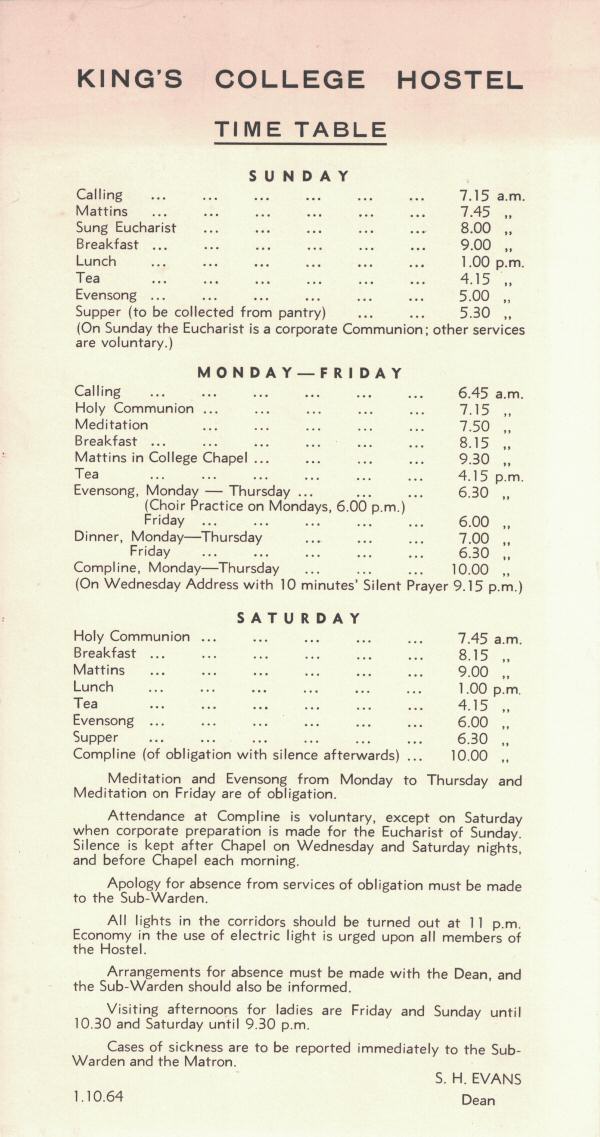
During the 1964-65 academic year there were more than 40 of us at Vincent Square. Here we lived in community under the watchful eye of Sydney Evans who, as well as being Dean of King's, was warden of the hostel. I don't think there was much that missed his eye. I suspect he was far more aware of what went on in the hostel than some of us might have imagined.
How many ordinands today would happily accept the disciplines that we accepted at Vincent Square with little or no demur? They were valuable disciplines that played an important part in our formation as future priests.
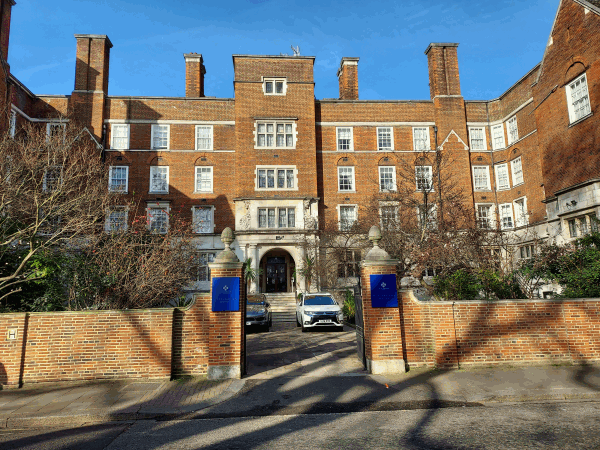
The former Theological Hostel in Vincent Square, now a hotel
Photo: © The Revd Michael Hatchett 2023
The hostel building is now the luxury 4-star Wellington Hotel. The former chapel has been turned into a conference room: The Chapel Suite. Another conference room, The Wellington Suite, looks like what was the dining hall.
St Boniface College, Warminster
In 1948 King's College leased St Boniface College, a former missionary college, to provide a postgraduate fourth year for ordinands, during which they could prepare for ministry both practically and spiritually, freed from the worry of having exams to pass. After three years of academic study in London, the year at Warminster was to provide a time of pastoral and practical learning, with experience of preaching, pastoralia, and mission, within a framework of devotional discipline and community living. That is a pretty good summary of what St Boniface College did provide during our year there.
There were 47 students on the 1965-66 course at Warminster. 43 of us joined it after completing our studies at the Strand. The others on the course were two overseas priests, Andrew Adeniyi from Nigeria and Harry Hinton from Canada, and two older men completing their ordination training, Fred Grubb and Louis Smith.
St Boniface College - Staff and Students - Michaelmas 1965
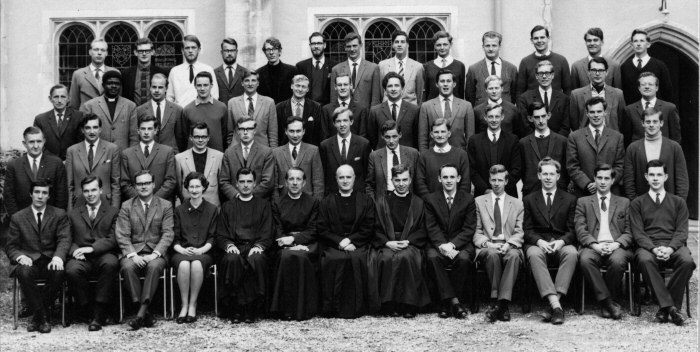
(Back row, left to right) David Clark, Philip Dearden, David Wickert, David Lowe, Richard Newall, Nigel Pond, Dudley Goodfield, Francis Cumberlege, Mervyn Terrett, John Broadhurst, Ian Zass-Ogilvie, Michael Leefield, Keith Plaister.
(Third row, left to right) Louis Smith, Andrew Adeniyi (Nigeria), Ernest Hepworth, David Icke, Jonothan Robertshaw, Geoffrey Wynne, John Benzon, John Newton, Anthony Roberts, Paul Renyard, Michael Anderson, Michael Smith, Roy Hancock.
(Second row, left to right) Fred Grubb, John Welsh, Richard Carr, Harold Hinton (from Canada), Adrian Vivian, Geoffrey Hooper, Andrew Stone, Jeffry Wilcox, Peter Adams, Dennis Crook, Brian Buxton, Richard Ford, Peter Delaney.
(Front row, left to right) Roger Clayton-Jones, John Tipping, Stephen Sandham, Miss Fitch (Matron), Michael Taylor (Chaplain), Sydney Evans (Dean of King's College, London), John Townroe (Warden), Sam Cutt (Sub-Warden), Antony Calladine, William Penney, Jeremy Martineau, Robin Turner, Peter Brown.
By the time we arrived at Warminster, those of us who had been at King's in London already knew each other well. We had studied together for three years and lived together for a year at Vincent Square. There was a strong spirit of camaraderie among us that continued to grow during this further year of living, worshipping, studying, and socialising together.
The ambience of the Wiltshire market town of Warminster was a marked change after living for three years in the bustle and noise of London. I liked the town and its surrounding countryside, close to places like Longleat and Frome. I remember that in the High Street was a butcher's shop, Chinns, that had a small restaurant attached. The steaks served here were excellent: the best I've ever had.
The staff running the course during our year at Warminster were John Townroe (Warden), Sam Cutt (Sub-Warden), and Michael Taylor (Chaplain). John Townroe had been at St Boniface College since the inception of the fourth-year course in 1948, initially as Chaplain and from 1956 as the Warden.
As at Vincent Square, our lives were governed by a timetable - shown below - again designed to develop our devotional lives and disciplines.
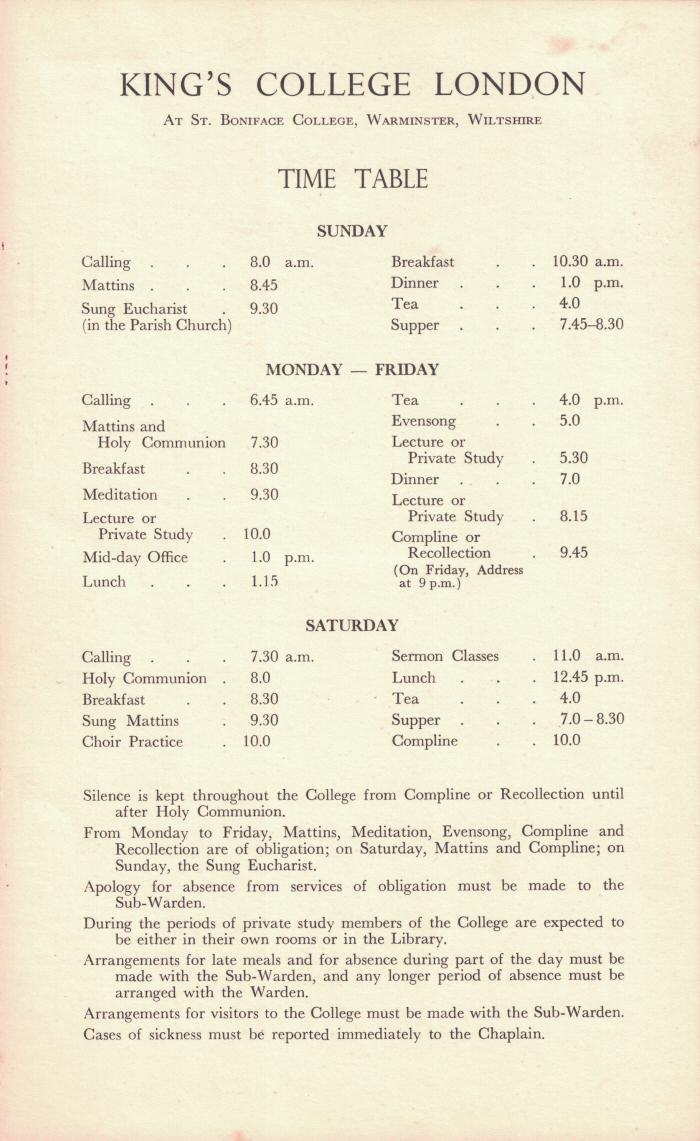
Lectures and Talks
The fourth-year course at Warminster provided a carefully considered programme of lectures and talks. Lectures by the three members of staff ranged from ones on Christian spirituality to those dealing with practicalities of parish ministry. We received, for example, guidance on matters such as doing baptisms and weddings, and the law relating to marriage. Additionally, there was a variety of thought-provoking talks by visiting speakers, such as Frank Lake on Clinical Theology. On these and other occasions there were lively group discussions. The lectures, talks and discussions were balanced by regular times set aside, as shown in the timetable above, for quiet private study.
Sermon Classes
These were held on Saturday mornings at 11 o'clock. One person (or was it two?) had to give a sermon in front of the Warden, Sub-Warden, Chaplain, and all his fellow students. Potentially quite a trial - emotionally and literally. After the sermon had been delivered there was feedback not only from each member of the staff but also from one's fellow students. Because by this time we knew each other so well, some of our peers could be less than inhibited in their comments and criticisms!
Sunday Evenings at Warminster
On Sunday evenings we went out 'two by two' to gain practical experience of leading worship by participating in the conduct of evensong at local churches. John Tipping and I were assigned to the village church at Dilton Marsh, where Fr Richard Sercombe was the parish priest. On Sunday evenings we would set out for Dilton Marsh on John's scooter, equipped with our cassocks, surplices and prayer books. It always felt to me that the church and its furnishings had a distinctly Victorian ambience. Perhaps even the conduct of evensong might not have felt unfamiliar to a Victorian worshipper.
It was at Dilton Marsh that John and I had our first experiences of preaching. An abiding memory is of a custom at Dilton Marsh that I had never encountered before and have never come across since. At the start of the sermon all the lights in the church were switched off. The only exception was the small lamp attached to the pulpit lectern to illuminate the preacher's notes. It felt very strange preaching into the inky darkness, to a completely invisible congregation. Only at the end of the sermon were all the lights switched on again.
After our evensong excursions on Sundays we would return to college for supper. On Sundays this was always 'a cold collation', a simple repast that was far from the height of gastronomy. This was the one occasion in the week when we had to wash up after our meal. No such luxury as 'mild green Fairy liquid' or another proprietary washing-up liquid - soda crystals were the provided surfactant.
The College Mission
During our Warminster year the annual college mission was to a parish in Corby, in Northamptonshire. At the time the life of the town was dominated by the large steelworks of Stewarts & Lloyds, established there in the 1930s.
The entire college, staff and students, decamped to Corby for a little over a week. We stayed, I think mostly in pairs, in the homes of parishioners. My hosts were most kind and hospitable, even taking two of us out in their car one afternoon to see places of interest in the surrounding area. Each day, again usually in pairs, we were invited to lunch in the homes of other parishioners. The generosity of these lunches made a big impression on me. More than ample portions, with a main course usually of meat and at least three veg. I wondered to what extent such splendid fare was a special effort because we were visitors and to what extent it reflected local culture. Were such substantial meals what Corby ladies usually cooked for their men, many of whom were employed in physically demanding jobs in the steelworks and would therefore have big appetites?
The form of the mission included small house-meetings held each evening in homes of parishioners. During the day we did house-to-house visiting around the parish, in pairs and wearing our cassocks. No one in the area could be unaware that something different was happening that week! Other elements of the mission were daily worship and intercession, prayer meetings, and special Sunday services at the start and end of the mission.
An Adventure Abroad
Peter Cowan, who was in our year at the Strand, was awarded a Philip Usher scholarship to spend a year in Greece studying aspects of the Greek Orthodox Church. (In consequence Peter did not go to Warminster until the year after us.) During the college vacation in October 1965 I and Harry Hinton, the Canadian priest on our year at Warminster, made a three-week visit to Peter in Ioannina, the main town of Epirus in northwest Greece. This was my first trip abroad. I was totally unaware of continental railway practices and the importance of reading destination boards before boarding a carriage. Consequently we had what could be described as an eventful train journey from Calais, via Paris and Milan, down to Brindisi in southern Italy before boarding an overnight ferry to Igoumenitsa where Peter met us.
Harry and I spent a most interesting and enjoyable time with Peter who was an excellent host and a good guide to Greek ways of doing things. The latter included navigating the extraordinarily bureaucratic procedure for purchasing a ticket in a bus station. Peter told us how to avoid the risk of being refused boarding by a bus driver if all the seats had been taken by those ahead of us in the queue. The trick was to climb on through the back door of the bus while everyone else was busy jostling and arguing in the queue at the front door. Apparently once you were on a bus you would never get thrown off. We used public service buses to get around. On these it was not unusual for some passengers to be accompanied by their poultry. On most of these buses, in the coachwork above the driver's head was a recess with an icon and a little electric sanctuary lamp. It was somewhat unnerving if this lamp was suddenly switched on as the bus gathered speed going downhill on roads with sharp hairpin bends.
The warmth and hospitality some Greeks showed to us, two complete strangers, on a number of occasions, made a big impression on me. I felt that even as a student I was probably better off than some of those displaying this generosity. As I have regularly observed, it is often the people who have the least who are most ready to share with others the little they do have. We may feel uncomfortable accepting gifts and hospitality from people who are clearly less well off than ourselves but refusal to accept can be deeply hurtful. There is a grace in receiving as well as giving.
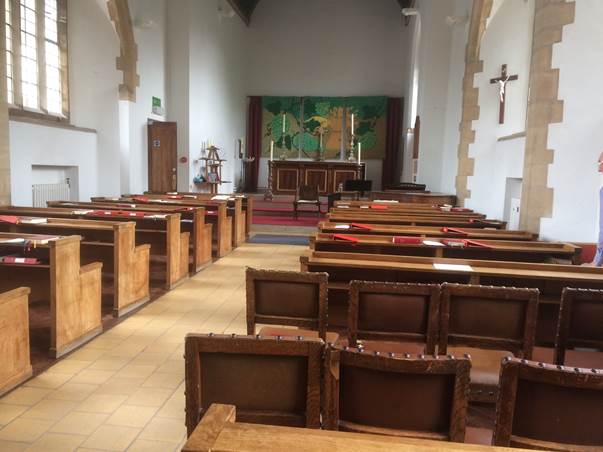
St Boniface College Chapel - July 2019.
Photo: © The Revd Ian Zass-Ogilvie 2019
Our Ordinations
After completing the Warminster course in early summer 1966, forty-one of us were made deacon on Trinity Sunday that year and one at Michaelmas. The 42 members of our cohort were all ordained priest the following year, 1967.
The Annual Warminster Conference, Reunion & Retreat
Although St Boniface College closed in 1969, links with those trained at Warminster were not lost. Through an initiative of John Townroe – who was at the college for the entire 21 years King's ran its fourth-year course at Warminster, first as Chaplain, and then Warden – an annual Conference, Reunion and Retreat was held at Warminster for more then forty years. Some 40 alumni attended for the inside of a week each year. John Townroe was a regular attender at these events until his death just three days after the 2018 reunion.
The 2017 Warminster Reunion
For those of us in the 1965-66 Warminster year, 2017 marked the 50th anniversary of our ordination as priests. To celebrate this milestone a 50th Anniversary Eucharist and Lunch was held on the first day of the 2017 Reunion (10th July), attended by fourteen of our year.
For most of us the 50th anniversary of our ordination as priests was, I think, an occasion for particular recollection and reflection. Not having visited Warminster since leaving in 1966, I was very keen to accept the invitation to the anniversary Eucharist and lunch. The reunion offered an opportunity to meet with some of our year for the first time in 51 years, as well as others who I had seen more recently. It was good to meet together to 'break bread' both spiritually and physically. It was good to enjoy once again the warm fellowship experienced at King's and Warminster in the 1960s.
Before the Eucharist we met in St Boniface Hall (the dining hall during our Warminster days) to enjoy a cup of coffee and to catch up with each other's news.
Our Eucharist was attended by John Townroe. Because of his need for wheelchair access, the service was held in the former Library, immediately below the chapel. Jeffry Wilcox presided, aided by Richard Ford who served, read the Gospel and administered the chalice. Jon Robertshaw preached. John Tipping had chosen the hymns and accompanied us on the piano. The assembled company sang in impressively good voice!
After the Eucharist and group photographs we crossed over the Bath road to Warminster School's Dining Hall where we enjoyed an excellent lunch and much good conversation.
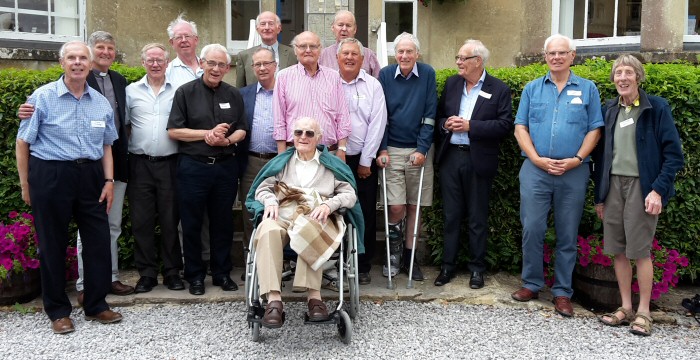
The July 2017 Reunion at St Boniface College, Warminster
John Townroe (in wheelchair, and from left to right) John Tipping, Jon Robertshaw, Paul Renyard, Jeremy Martineau, Jeffry Wilcox, Robin Turner, Richard Carr, Stephen Sandham, Ian Zass-Ogilvie, Tony Roberts, Francis Cumberlege, Michael Anderson, Richard Ford, Richard Newall.
We were most grateful to Ian Zass-Ogilvie, one of our year, for all his work in planning and preparing for such a successful and enjoyable anniversary celebration.
The Final Warminster Conference, Reunion & Retreat
This event took place in July 2019. St Boniface College had closed in 1969. By 2019 even the youngest of those who trained at Warminster were in their seventies. Taking into account age, infirmities and accommodation issues it was decided, with some regret, that the 2019 reunion should be the last.
After the reunion the following report was prepared by Richard Ford (The Strand 1962-65. Warminster 1965-66).
Warminster - The Last Hurrah
It was a good year - and a good time to finish. For over 30 years clergy trained at King's College, London and St Boniface College, Warminster have been meeting for an Annual Reunion and Retreat. No other theological college, living or departed, has achieved this. After much deliberation we decided that this would be our final year. We're getting older and creakier, better to finish now than to dwindle down to a fragile few.
Nearly 50 former students turned up to mark this special and sad occasion. My vintage, 1965-66, has always been well represented - a cheerful, if occasionally noisy, bunch. There were lots of memories of friends and colleagues. We thought particularly of John Townroe who died last year, aged 98. He was a wise and kindly presence at our annual gathering. He had been Chaplain and then Warden from 1948 to 1969, and a valued counsellor, guide and friend until his death.
In Chapel we looked like a bunch of old soldiers - which, of course, is what we were. More walking sticks every year, and the stairs got steeper. It was here that we renewed our Ordination Vows, remembered St Benedict, St Boniface, our departed brothers, and our two college martyrs, missionary priests who died in the Boxer Rebellion early in the 20th century. Here and there are hints of Warminster's previous existence as a Missionary College - one floor in the old building is still labelled "China" and another "Corea" (sic).
Our lecturer this year was to have been Dr John Moses, formerly Dean of St Paul's. Sadly John was not well enough to attend - we wish him well. Instead, three in-house addresses given by Richard Hayes, Chris Brown and Rob Yeomans filled the gap more than adequately. Bishop Stephen Oliver led us through a series of reflections and meditations on the different qualities of silence. There's a general feeling that this was one of the best Retreats. Bishop Stephen is a Kingsman too, his final year was at St Augustine's, Canterbury.
Warminster is a lot smarter than it used to be. The buildings and grounds are used by Warminster School. The single field where we used to lose at cricket and football (we were not a sporty year) is now part of a complex of sports facilities. Chinese students on an English Language Summer School wandered around - smiley, well-behaved, glued to their mobiles.
Theological training has changed radically since our day and there's a tendency for us to feel like dinosaurs. Many changes have been for the better, not least the realisation that ministry is not the presence of a full-time, male, professional priesthood. But the King's system of three years in The Strand and a post-grad year at Warminster (later at Canterbury) had an intellectual range and rigour that is rare in the C of E today. Rowan Williams described the King's training as Catholic Humanism - we could do with more of it today.
The week ended and we said our farewells. Many of us will continue to meet in regional groups and, of course, the work continues. The Holy Spirit doesn't accept dead-ends. The St Boniface Trust will continue to give financial support to theological students, chiefly from overseas. While we are fit and able we shall continue to serve in parishes up and down the country.
I was one of the last to leave and I wandered around a bit. The trees are lovely this summer. Two horse chestnuts were planted years ago and one was badly damaged in a storm. John Townroe insisted that it should be allowed to grow. And it did. It's a bit twisted, broad and massive - not far away is its tall and elegant neighbour. John Townroe saw this as a powerful parable. My favourite is the lime tree over where the car park now is. This year it's a towering mass of fragrant flowers, their scent reaches everywhere. I breathed in a final lungful and drove away.
Group photograph of the July 2019 Reunion at St Boniface College, Warminster
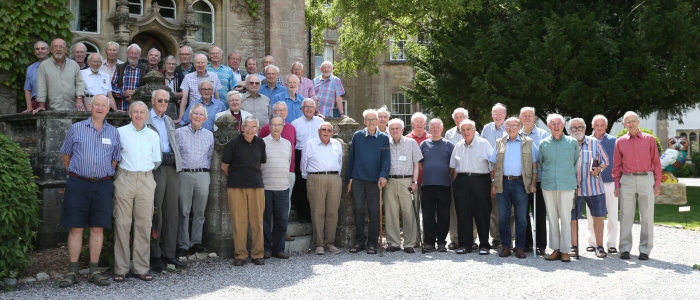
Photograph courtesy of and © David Wiltshire Photography 2019
Front row left to right: Peter Westwood; Roger Wikeley; John Perry; Peter Rapsey; Tony Smith; Robin Turner; Derek Duncanson; Alan Ramsey; Michael Nuttall; Paul Renyard; Richard Maynard; Norman Woods; David Woodley; Michael Crow; Richard Hayes.
Second row left to right: Stephen Oliver (in clerical collar); Peter Whittaker; Paul Longbottom; David Steven; John Willard; Francis Cumberledge; David Hayes; Ian Zass-Ogilvie; Chris Brown.
Third row left to right: Michael Jarrett; Ian Chisholm; Stuart Morris.
Fourth row left to right: Rob Yeomans; John Palmer; George Royle; Nigel Johnson; Giles Harris-Evans; Richard Ford.
Back row left to right: Anthony Appleby; Chris Channer; Colin Pritchard; John Tipping; Frank Bentley; Stephen Sandham; Andrew Sangster; Peter Lock; Phillip McFadyen; Simon Wright; David Bruno.
Page created: 25 Jul 2024